Mario Orospe Hernández says a rapid escalation of lithium extraction in the Bolivian Andes conflicts with the beliefs of Indigenous communities who call the region home.
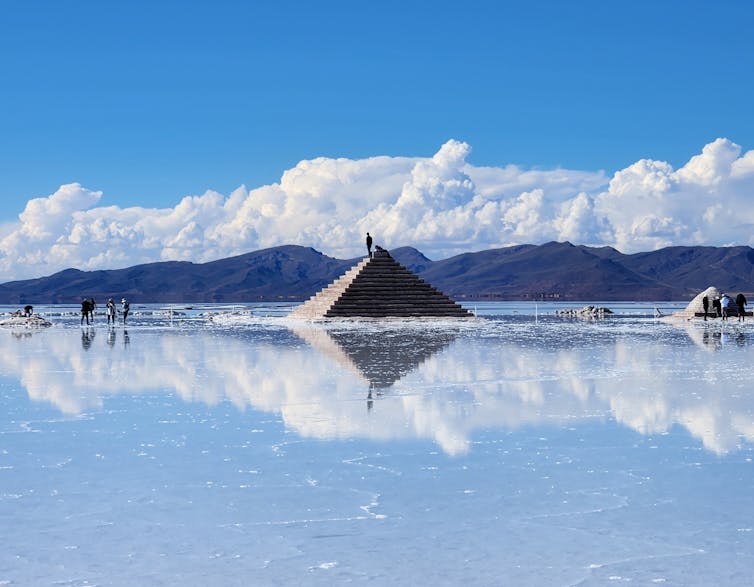
A salt pyramid in Uyuni, Bolivia. The rainy season produces a mirror effect in the salt flat. (Mario Orospe Hernandez, CC BY-NC-ND)
By Mario Orospe Hernández
Arizona State University
 Located in the heart of South America, Bolivia contains the largest lithium deposits in the world – an enviable position, in many countries’ eyes, as the market for electric vehicles takes off.
Located in the heart of South America, Bolivia contains the largest lithium deposits in the world – an enviable position, in many countries’ eyes, as the market for electric vehicles takes off.
Though EVs emit fewer greenhouse gases than fuel-powered vehicles, their batteries require more minerals — especially lithium, which is also used to make batteries for smartphones and computers.
Unlike its neighbors Chile and Argentina, Bolivia has yet to become a major player in the global lithium market. In part, this is because its high-altitude salt flats aren’t suited to the usual extraction method, solar evaporation.
[See Consortium News — “Chile Chilean President Plans to Nationalize Lithium Industry“]
But that looks poised to change in Bolivia: In January 2023, state company YLB signed an agreement with the Chinese consortium CBC, which includes the world’s largest producer of lithium-ion batteries, to introduce a new method called direct lithium extraction.
It may prove an economic boon. But since colonial times, the legacy of mineral abundance in Bolivia has also been one of pollution, poverty and exploitation. While some residents are hopeful about the potential benefits of the growing lithium industry, others are concerned about extraction’s local impact.
In particular, direct lithium extraction demands a great deal of fresh water, potentially endangering surrounding ecosystems as has happened in other parts of South America’s “lithium triangle.”
A rapid escalation of lithium extraction in the Bolivian Andes also represents a looming clash between two fundamentally different views of nature: modern industrial society’s and that of the Indigenous communities who call the region home – a focus of my current research collaborations and dissertation project.
The Pachamama
Bolivia is home to 36 ethnic groups across its highland and lowland regions. Aymara and Quechua peoples comprise most of the Indigenous communities in the Andes Mountains.
For these cultures, nature is not a means to human ends. Instead, it is seen as a group of beings with personhood, history and power beyond human reach. For example, the female divinity of fertility, to whom people owe respect, is the Pachamama.
Since she sustains and secures the reproduction of life, Andean Indigenous people make offerings to the Pachamama in ancestral rituals known as “challas” that seek to reinforce their connection with her.
Similarly, highland groups recognize mountains not as a set of inert rocks, but as ancestral guardians called “Achachilas” in Aymara and “Apus” in Quechua. Each Andean community praises a nearby mountain whom they believe protects and oversees their lives.
In Uyuni, for example, where one of the two new lithium plants will be constructed, Indigenous communities acknowledge the presence of these sacred beings. To this day, worshipers in nearby Lipez region explain the salt flat’s origin with a traditional legend: It is the mother’s milk of their Apu, a female volcano named Tunupa.
However, religious concepts such as “sacred” or “divine” do not necessarily capture the relationships that Andean Indigenous people have long established with these more-than-human beings, who have been known since pre-colonial times as “huacas.” These entities are not considered “gods,” or thought of as dealing with otherworldly beliefs. Rather, they are treated as integral to people’s earthly everyday life.
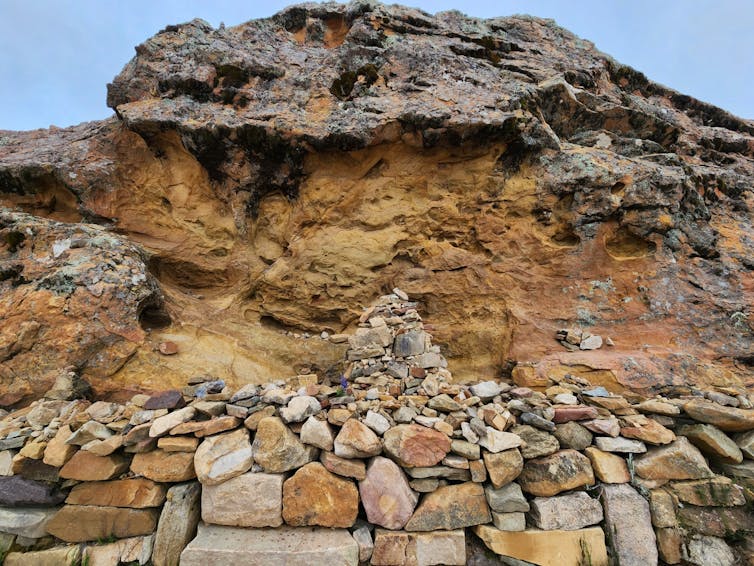
A Quechua huaca, also known as the sanctuary of the sacred rock, on the Island of the Sun in Lake Titicaca. (Mario Orospe Hernandez, CC BY-NC-ND)
For instance, before meals, Quechua and Aymara peoples throw coca leaves or spill their drinks on the ground to share their food with these beings as a sign of gratitude and reciprocity.
Lifeless Matter
In industrial societies, on the other hand, nature is understood as something external to humanity – an object that can be mastered through science and technology. The modern economy turns nature into a source of raw materials: morally and spiritually inert matter that is there to be extracted and mobilized worldwide.
Within this framework, a mineral like lithium is a resource to be developed in the pursuit of economic gains for human beings.
In fact, the history of these competing notions is deeply entwined with the history of the colonial era, as different cultures came into violent conflict. As the Spanish discovered the mineral bounty of the so-called New World, like gold and silver, they began an intensive extraction of its riches, relying on forced labor from local people and imported slaves.
The concept of “raw materials” can be traced to the theological notion of “prime matter.” The term originally comes from Aristotle, whose work was introduced to Christianity via Latin translations around the 12th century.
In the way Christians adapted his idea of prime matter, everything was ordered by its level of “perfection,” ranging from the lowest level – prime matter, the most basic “stuff” of the world – to rocks, plants, animals, humans, angels and, finally, God.
The Catholic Church and the Spanish Empire later used this medieval understanding of matter as something passive, without spirit, to justify the extraction of resources during colonial times. The closer things were to prime matter, their argument supposed, the more they needed human imprint and an external purpose to make them valuable.
This notion was also used by Christian colonizers who were intent on destroying traditions that they saw as idolatrous. In their eyes, reverence toward a mountain or the earth itself was worshiping a mere “thing,” a false god. The church and the empire believed it was critical to desacralize these more-than-human beings and treat them as mere resources.
This flattened vision of nature served as the basis for the modern economic concept of raw materials, which was introduced in the 18th century with the birth of economics as a social science.
The Road Ahead
Bolivia’s lithium projects pose a new potential clash of worldviews.
However, extraction initiatives have faced severe setbacks in the last few years, including social protests, the 2019 political crisis and a lack of necessary technology. The Chinese deal represents a new milestone, yet its outcomes are still uncertain: for the economy, for local communities and for the Earth.
Today, electric vehicles are widely considered part of the solution to the climate crisis. Yet they will necessitate a mining surge to meet their battery demands.
If societies really want a greener future, technological shifts such as EVs will be just part of the answer, alongside other changes like more sustainable urban planning and improved public transportation.
But in addition, perhaps other cultures could learn from Andean relations with nature as more-than-human beings: an inspiration to rethink development and turn our own way of living into something less destructive.![]()
Mario Orospe Hernández, Ph.D. candidate in religious studies, Arizona State University
This article is republished from The Conversation under a Creative Commons license. Read the original article.
The views expressed are solely those of the author and may or may not reflect those of Consortium News.

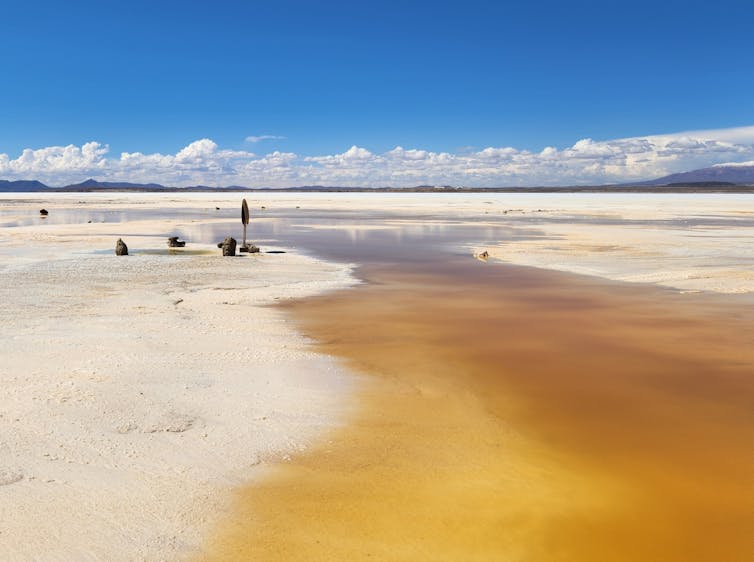
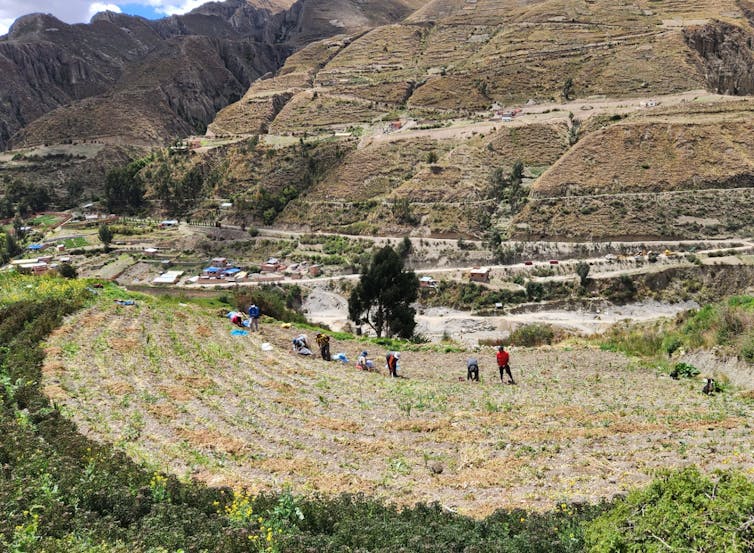
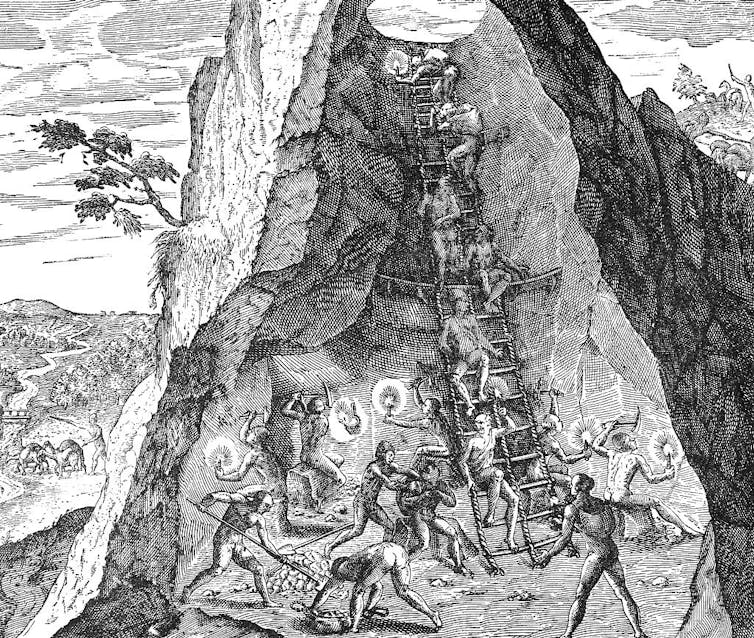
The trouble with the Christian adaptation of the Latin and/or Primal concept of prime matter is that it has, given the underlying greed and over-exploitation bases of “Christian” civilization, inevitably led to the misguided perception of even “lesser” HUMANS themselves as prime matter. YOU are the carbon they want to reduce ! So, when the fundamental problem of runaway elite GREED is addressed then human sustainability and climate mitigation would all take care of themselves naturally !
The Western ‘values’ on display once again…
And what thinks Washington??? One more natural resource to steal no matter what or how.
Resource extraction: classic capitalist motive method and means (AKA War / Coup etc.)
as employed by the USA… Musk’$ “Deal with it!” merely restates SOP!
The natural world is more real then the imaginary theological mythology that is used to give mankind exclusive privileges to extract profits and wealth by military or economic force. Our ecological stresses from this just keep mounting as we pretend to be superior beings with a permissive god of our own making.
Bolivia also has tungsten, needed in machining, and otherwise mostly mined in China.
There is no such thing as sustainable mining and lithium is no different.
Extractionism, and I live in S. America, is killing the earth and the way of life of indigenous peoples.
For what?
Kill the host.
Copper, bauxite, silver, gold, diamonds, lithium are all responsible in one form or another for the atrocities of colonialism both neo and pre-neo.
Americans do not care.
Most do not even know where Bolivia is or that it was a narco-state set up by Klaus Barbie and the CIA..
And remember Elon Musk’s remark during the 2019: “We coup who we want.”
This is the state of the world.
And it is the world for China will need that lithium too.
What needs to emerge is a new consciousness.
Alas, we cannot even see much class consciousness let alone know if the body is alive.
Monopoly capitalism, be it State capitalism as in China or cowboy capitalism as in the US and other similar countries, is literally killing us.
I think the hard choice humanity is avoiding is what you’ve described here. We need to lower our demand for energy. Unless some yet undiscovered technology comes along that provides abundant, clean, cheap, reliable energy, we are looking at rethinking how we live on this planet.
That wold be known as nuclear energy. Unfortunately, environmentalists have stymied development of this clean, efficient source of energy.
Nuclear energy is neither cheap nor safe.
This is without doubt our only way through our current predicament for living on this earth. One seminal book that lays out a viable strategy not only for surviving, but for re-imagining an authentic life for human beings as an integral but not domineering species is “Abundant Earth” by Eileen Crist, subtitled “Toward an Ecological Civilization.” A brilliant and thoughtfully crafted guide for a profoundly different way humans can find their natural place in the world.
Thank you for the reference. I’ll definitely add to my reading list.
I would be more convinced by these arguments if the writer were speaking about the controversial industrial developments on native American land in the USA. Instead he speaks out (from Arizona) about a foreign country where China won mining rights because China proposed to leave much more wealth in Bolivia than the US company which bid for the same contract.
One can and should be mutually critical of everything from the lingering or ongoing adverse human and environmental impacts of everything from, e.g., Kerr-McGee’s uranium mining operations on Navajo Nation territory that have led to rising cancer rates and other human health hazards (simply one more tally on that MIC-embedded corporation’s sordid reputation – see Ed Lion, “CIA Intrigue Suggested in Nuke Worker’s Death,” United Press International, March 30, 1981), to the TexPet consortium’s systematic contamination of the Lago Agrio region in Ecuador through petroleum extraction that has led to the extinction of the Teteté and ongoing suffering for other indigenous communities (in which not only ChevronTexaco is complicit, as Steven Donziger has made great personal sacrifices to highlight, but also the state-owned Petroecuador under both neoliberal and “Pink Tide” governments), to the Bolivian YLB-Chinese CBC partnership for lithium extraction that now potentially threatens indigenous peoples and landscapes in Bolivia, repeating the legacy of the infamous “mountain that eats men,” the Potosí silver mine of the Spanish colonial era (activities which Elon Musk certainly has no compunctions about “couping whoever he wants” to join in on, for several of his other commendable efforts to promote more pluralistic discourse).